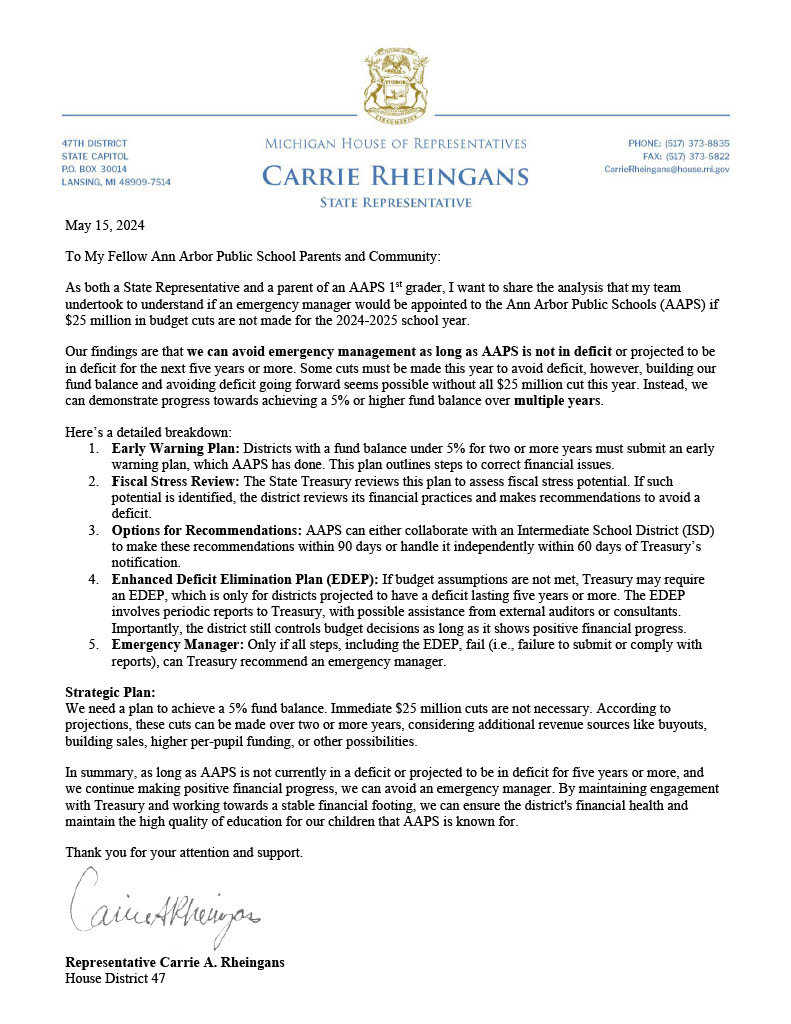by P.D. Lesko
Between 2020 to 2022, when AAPS went to distance education and shut down childcare, enrollment dropped by over 1,000 students. Pupil funding–$9,608 per child in this year’s state school budget— plummeted. A loss of 1,000 students cost AAPS $9.6 million per year, a blow to the budget.
Members of the AAPS Board of Trustees, as well as district parents are concerned that because of the District’s looming $25 million deficit, which is projected to take the District’s Fund Balance below the State required 5 percent, an Emergency Manager may be assigned by Michigan officials. In an April 2024 op-ed published by The Detroit Free Press, Lilia Cortina, a district parent and a professor of psychology and chair of women’s and gender studies at the University of Michigan wrote, “The Ann Arbor school system must right its financial ship. Raise the fund balance back to healthy levels. If it does not, the state will swoop in to assign an emergency financial manager.”
According to a recent letter from State Rep. Carrie Rheingans to the AAPS leaders and Trustees, Cortina’s assertions, above, were uniformed and untrue.
Ann Arbor Rep. Carrie Rheingans sent a letter to be read at the most recent meeting of the Ann Arbor Public Schools Board of Trustees on May 16. In a series of Tweets posted on May 17, Rep. Rheingans began, “I submitted a written comment to the school board, so it apparently wasn’t just read when my name was called.”
Rheingans said she and her staff had initiated talks with officials within the Michigan Treasury Dept. about the possibility of the Ann Arbor Public Schools being taken over by the State with an Emergency Manager assigned to oversee the District’s $350 million budget. “Over the past few weeks, my staff & I have been speaking with the Michigan Departments of Treasury & Education, along with the legislature’s legal team,” wrote Rheingans on Twitter.
She went on to say that based on her conversations with Treasury officials and analysis done by her staffers: “It seems to us that we are several steps away from an emergency manager takeover. From what we learned, we [AAPS] would need to be in deficit – not just have a low fund balance – or projected to be in deficit for 5 years or more.”
According to Rheingans, district officials would need to engage with Michigan Treasury officials and show how the District will work towards a 5 percent or larger fund balance over time.
This “is all that is necessary at this point,” claims Rheingans.
There have been several protests by AAPS teachers and parents related to new Superintendent Jazz Parks’s plans to lay-off AAPS employees, allegedly including hundreds of teachers.
According to AAPS budget documents, since 2014, the AAPS budget has doubled to over $350 million, but the total number of students rose by only 5 percent. During the same time period, AAPS officials hired over 480 new staff members, including 417 teachers.
While facing a $25 million budget deficit, AAPS recently raised salaries and benefits by $13 million.
In her Twitter thread, Rep. Rheingans said, “We [AAPS] may not need to make $25 million in cuts in just one year. If we [AAPS] have a positive fund balance (even if below 5 percent) and show [the district] is taking correctional steps, the information we received shows” an emergency manager will not be appointed.”
According to Public Act 72 of 1990 and Public Act 436, the state is authorized to intervene in units of local government, including school districts, that experience financial emergencies. “An Emergency Manager can only be put in place if local elected officials fail to take the steps necessary to prevent a financial emergency.”
According to 2023 reporting by Michigan Advance, “In Michigan, the state has an unusual amount of discretion in initiating oversight, and its emergency managers have an unusual amount of authority, according to researchers. Compared with those of other states, Michigan’s takeover powers have also been among the most widely used. Since 2000, under various versions of the law, 10 Michigan municipalities have come under the control of at least one emergency manager. So did several public school districts, including Detroit’s.”
Thus far, only Michigan districts where the student body is majority Black have been taken over by the State and had emergency managers assigned. Ann Arbor would be the first majority white student body district whose operations were taken over by the State of Michigan. Research into Michigan’s Emergency Manager program done by Cornell University researchers concluded that among the school districts taken over, the student poverty rate was between 20-50 percent.
According to data from the Michigan Dept. of Education, 16.5 percent of Ann Arbor’s study body is eligible to receive free or reducted-price lunches. Public records show that in Washtenaw County 31.2 percent of all students qualify for free or reduced-price lunches.
Public Act 436 can be implemented when a school district asks the Governor for a fiscal review, or if the district’s fiscal mismanagement and fiscal problems come to the attention of state officials who then conduct a fiscal review.
Read Rep. Rheingans’s letter to AAPS officials below:



Comments are closed, but trackbacks and pingbacks are open.